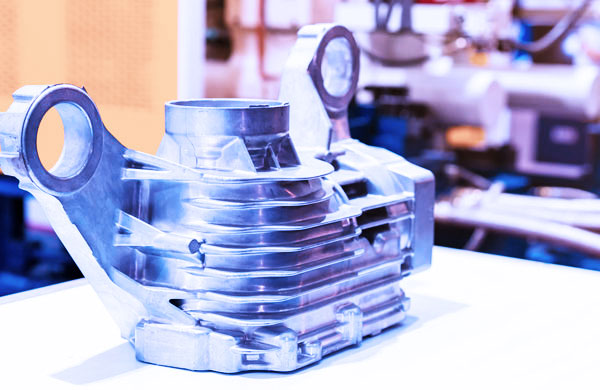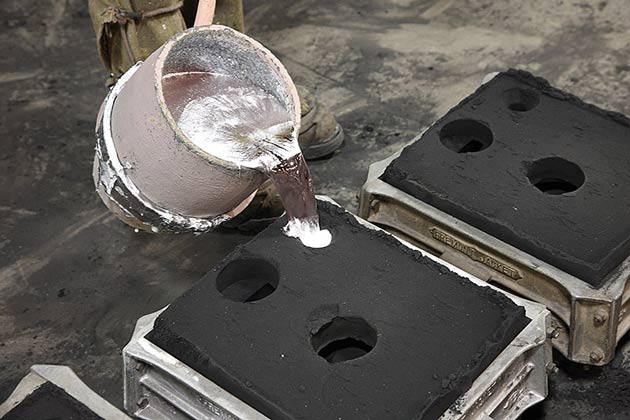The Definitive Guide to Stahl Specialty Company
The Definitive Guide to Stahl Specialty Company
Blog Article
Not known Facts About Stahl Specialty Company
Table of ContentsIndicators on Stahl Specialty Company You Should KnowThe Best Strategy To Use For Stahl Specialty CompanyThe 6-Minute Rule for Stahl Specialty CompanyMore About Stahl Specialty CompanyTop Guidelines Of Stahl Specialty Company
The refined distinction depends on the chemical content. Chemical Contrast of Cast Aluminum Alloys Silicon promotes castability by lowering the alloy's melting temperature and boosting fluidity during spreading. It plays an important role in permitting detailed mold and mildews to be filled accurately. Additionally, silicon contributes to the alloy's toughness and put on resistance, making it useful in applications where durability is important, such as automobile parts and engine components.It additionally enhances the machinability of the alloy, making it much easier to process right into finished products. In this method, iron adds to the overall workability of light weight aluminum alloys.
Manganese adds to the strength of aluminum alloys and enhances workability. Magnesium is a light-weight element that offers stamina and influence resistance to light weight aluminum alloys.
Zinc boosts the castability of aluminum alloys and helps control the solidification process during spreading. It enhances the alloy's strength and hardness.
Indicators on Stahl Specialty Company You Should Know
Since aluminum-silicon alloys have good spreading homes, high gas homes, simple processes, and superb rust resistance, aluminum-silicon alloys are most typically used in the die-casting industry in the house and abroad. At the same time, aluminum-silicon alloys are also reasonably very early and commonly acknowledged alloys established and made use of in die-casting. After continuous study and enhancement, most of the existing worldwide mainstream aluminum-silicon alloys have been finalized and are absolutely nothing more than A356, A360, A380, ADC12, B390, and A413.
The primary thermal conductivity, tensile stamina, return stamina, and elongation differ. Select suitable raw products according to the performance of the target item produced. Among the above alloys, A356 has the highest possible thermal conductivity, and A380 and ADC12 have the most affordable. The tensile restriction is the opposite. A360 has the very best return toughness and the highest prolongation rate.

What Does Stahl Specialty Company Do?
In accuracy casting, 6063 is fit for applications where elaborate geometries and premium surface coatings are critical. Examples consist of telecommunication units, where the alloy's superior formability enables streamlined and visually pleasing designs while maintaining architectural stability. In the Lighting Solutions industry, precision-cast 6063 components create stylish and effective lights components that call for detailed forms and excellent thermal efficiency.
(https://pinshape.com/users/7350411-stahlspecialc#prints-tab-open)
The A360 shows exceptional prolongation, making it optimal for facility and thin-walled components. In accuracy spreading applications, A360 is appropriate for sectors such as Consumer Electronic Devices, Telecommunication, and Power Devices.

In precision spreading, aluminum 413 radiates in the Customer Electronics and Power Equipment sectors. This alloy's remarkable deterioration resistance makes it an outstanding selection for outside applications, guaranteeing long-lasting, long lasting products in the mentioned markets.
The 6-Minute Rule for Stahl Specialty Company
The light weight aluminum alloy you pick will considerably influence both the spreading procedure and the properties of the last product. Since of this, you must make your choice carefully and take an educated approach.
Establishing one of the most appropriate light weight aluminum alloy for your application will mean weighing a wide array of features. These comparative alloy characteristics adhere to the North American Pass Away Spreading Association's standards, and we've split them right into 2 categories. you could try these out Foundry. The very first classification addresses alloy characteristics that impact the production procedure. The 2nd covers characteristics impacting the properties of the last product.
The alloy you pick for die casting directly affects a number of aspects of the casting process, like just how easy the alloy is to function with and if it is susceptible to casting issues. Warm splitting, also referred to as solidification splitting, is a common die casting flaw for aluminum alloys that can result in inner or surface-level rips or cracks.
The Ultimate Guide To Stahl Specialty Company
Specific aluminum alloys are extra prone to warm fracturing than others, and your choice must consider this. Aluminum Casting. It can damage both the cast and the die, so you must look for alloys with high anti-soldering buildings.
Rust resistance, which is already a remarkable feature of aluminum, can differ considerably from alloy to alloy and is an important characteristic to consider depending on the environmental problems your item will certainly be exposed to. Wear resistance is another building typically looked for in light weight aluminum products and can distinguish some alloys.
Report this page